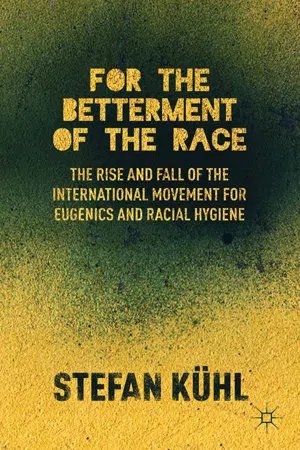
For the Betterment of the Race
The Rise and Fall of the International Movement for Eugenics and Racial Hygiene
- English
- ePUB (mobile friendly)
- Available on iOS & Android
For the Betterment of the Race
The Rise and Fall of the International Movement for Eugenics and Racial Hygiene
About This Book
Racism, race hygiene, eugenics, and their histories have for a long time been studied in terms of individual countries, whether genocidal ideology in Nazi Germany or scientific racial theories in the United States. As this study demonstrates, however, eugenic racial policy and scientific racism alike had a strongly international dimension. Concepts such as a 'Racial Confederation of European Peoples' or a 'blonde internationalism' marked the thinking and the actions of many eugenicists, undergirding transnational networks that persist even today. Author Stefan Kühl provides here a historical foundation for this phenomenon, contextualizing the international eugenics movement in relation to National Socialist race policies and showing how intensively eugenicists worked to disseminate their beliefs throughout the world.
Frequently asked questions
Information
Table of contents
- Cover
- Title
- Introduction
- One The Dream of the Genetic Improvement of Mankind–The Formation of the International Eugenics Movement
- Two The First World War and Its Effect on International Eugenics
- Three Racism, Internationalism, and Eugenics
- Four The Crisis of Orthodox Eugenics and the Rise of Human Genetics and Population Science
- Five National Socialist Germany and the National Eugenics Movement
- Six The Second World War and the Mass Murder of the Sick and Handicapped
- Seven On “Good” and “Bad” Eugenics: Refocusing on Human Genetic Counseling and the Struggle against “Overpopulation”
- Eight The Renaissance of Racist Eugenics
- Nine The Dissolution of the Eugenics Movement: Will There Be Eugenics without Eugenicists?
- Afterword
- Notes
- Sources and Bibliography
- Index of Persons